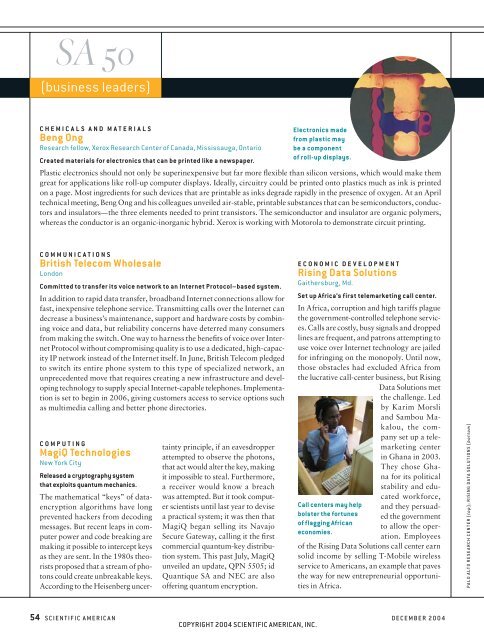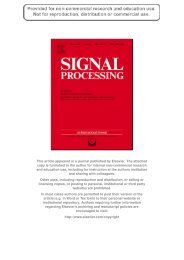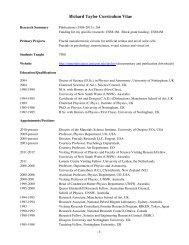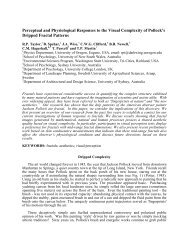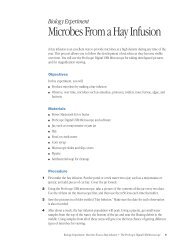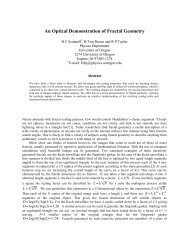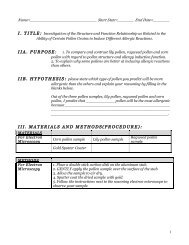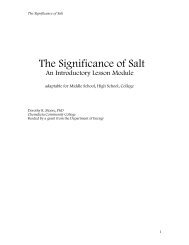December 2004 - Materials Science Institute - University of Oregon
December 2004 - Materials Science Institute - University of Oregon
December 2004 - Materials Science Institute - University of Oregon
You also want an ePaper? Increase the reach of your titles
YUMPU automatically turns print PDFs into web optimized ePapers that Google loves.
SA 50<br />
(business leaders)<br />
CHEMICALS AND MATERIALS<br />
Beng Ong<br />
Research fellow, Xerox Research Center <strong>of</strong> Canada, Mississauga, Ontario<br />
Created materials for electronics that can be printed like a newspaper.<br />
Electronics made<br />
from plastic may<br />
be a component<br />
<strong>of</strong> roll-up displays.<br />
Plastic electronics should not only be superinexpensive but far more fl exible than silicon versions, which would make them<br />
great for applications like roll-up computer displays. Ideally, circuitry could be printed onto plastics much as ink is printed<br />
on a page. Most ingredients for such devices that are printable as inks degrade rapidly in the presence <strong>of</strong> oxygen. At an April<br />
technical meeting, Beng Ong and his colleagues unveiled air-stable, printable substances that can be semiconductors, conductors<br />
and insulators—the three elements needed to print transistors. The semiconductor and insulator are organic polymers,<br />
whereas the conductor is an organic-inorganic hybrid. Xerox is working with Motorola to demonstrate circuit printing.<br />
COMMUNICATIONS<br />
British Telecom Wholesale<br />
London<br />
Committed to transfer its voice network to an Internet Protocol–based system.<br />
In addition to rapid data transfer, broadband Internet connections allow for<br />
fast, inexpensive telephone service. Transmitting calls over the Internet can<br />
decrease a business’s maintenance, support and hardware costs by combining<br />
voice and data, but reliability concerns have deterred many consumers<br />
from making the switch. One way to harness the benefi ts <strong>of</strong> voice over Internet<br />
Protocol without compromising quality is to use a dedicated, high-capacity<br />
IP network instead <strong>of</strong> the Internet itself. In June, British Telecom pledged<br />
to switch its entire phone system to this type <strong>of</strong> specialized network, an<br />
unprecedented move that requires creating a new infrastructure and developing<br />
technology to supply special Internet-capable telephones. Implementation<br />
is set to begin in 2006, giving customers access to service options such<br />
as multimedia calling and better phone directories.<br />
COMPUTING<br />
MagiQ Technologies<br />
New York City<br />
Released a cryptography system<br />
that exploits quantum mechanics.<br />
The mathematical “keys” <strong>of</strong> dataencryption<br />
algorithms have long<br />
prevented hackers from decoding<br />
messages. But recent leaps in computer<br />
power and code breaking are<br />
making it possible to intercept keys<br />
as they are sent. In the 1980s theorists<br />
proposed that a stream <strong>of</strong> photons<br />
could create unbreakable keys.<br />
According to the Heisenberg uncer-<br />
tainty principle, if an eavesdropper<br />
attempted to observe the photons,<br />
that act would alter the key, making<br />
it impossible to steal. Furthermore,<br />
a receiver would know a breach<br />
was attempted. But it took computer<br />
scientists until last year to devise<br />
a practical system; it was then that<br />
MagiQ began selling its Navajo<br />
Secure Gateway, calling it the fi rst<br />
commercial quantum-key distribution<br />
system. This past July, MagiQ<br />
unveiled an update, QPN 5505; id<br />
Quantique SA and NEC are also<br />
<strong>of</strong>fering quantum encryption.<br />
ECONOMIC DEVELOPMENT<br />
Rising Data Solutions<br />
Gaithersburg, Md.<br />
Set up Africa’s first telemarketing call center.<br />
In Africa, corruption and high tariffs plague<br />
the government-controlled telephone services.<br />
Calls are costly, busy signals and dropped<br />
lines are frequent, and patrons attempting to<br />
use voice over Internet technology are jailed<br />
for infringing on the monopoly. Until now,<br />
those obstacles had excluded Africa from<br />
the lucrative call-center business, but Rising<br />
Data Solutions met<br />
the challenge. Led<br />
by Karim Morsli<br />
and Sambou Ma -<br />
kalou, the company<br />
set up a telemarketing<br />
center<br />
in Ghana in 2003.<br />
They chose Ghana<br />
for its political<br />
stability and edu-<br />
Call centers may help<br />
bolster the fortunes<br />
<strong>of</strong> flagging African<br />
economies.<br />
cated workforce,<br />
and they persuaded<br />
the government<br />
to allow the operation.<br />
Employees<br />
<strong>of</strong> the Rising Data Solutions call center earn<br />
solid income by selling T-Mobile wireless<br />
service to Americans, an example that paves<br />
the way for new entrepreneurial opportunities<br />
in Africa.<br />
54 SCIENTIFIC AMERICAN DECEMBER <strong>2004</strong><br />
COPYRIGHT <strong>2004</strong> SCIENTIFIC AMERICAN, INC.<br />
PALO ALTO RESEARCH CENTER (top); RISING DATA SOLUTIONS (bottom)


